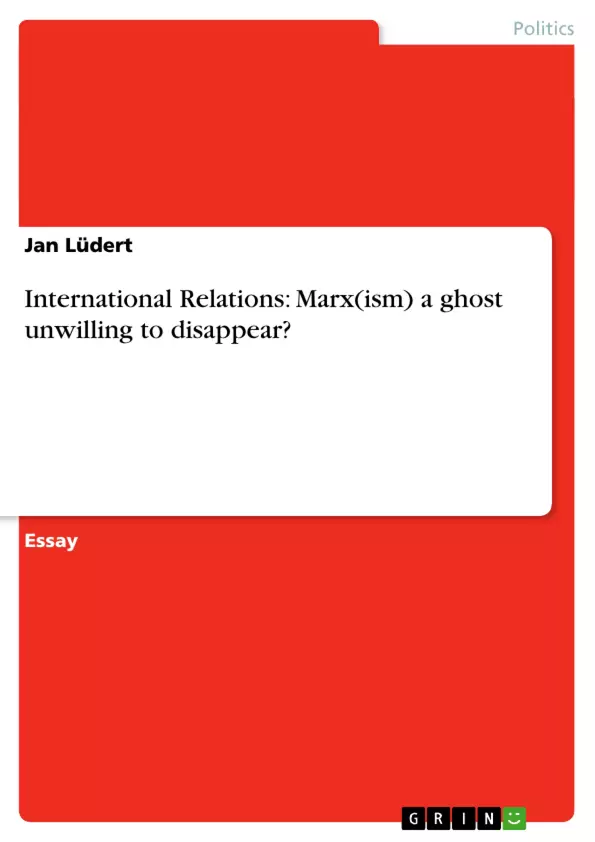In the midst of the turbulent political and economic transformation during 1989, Francis Fukuyama
declared the “end of history” in his [in]famous article, intending to seal the coffin of communist
ideology once and for all, declaring the western camp as the winner of the cold war and more
importantly of liberal capitalism over communism.1 However, a peculiar question remains for
students of International Relations.2 Is it still worth studying Marxist theory today since the former
communist Soviet Union and its satellites, no longer practice a [certain and often-incoherent]
version of Marxist ideology?
This paper does not attempt to advocate a utopian klassenlose society in conjunction with radical
and totalitarian outgrowths that had been developed during the 20th century from Stalinist gulags to
the Maoist Cultural Revolution. Despite this, this paper aims to show the merits of Marxist theory,
especially the concept of historical materialism, and how, in at least three respects, it adds to the
study of International Relations.
Inhaltsverzeichnis (Table of Contents)
- I. Introduction
- II. Divorcing Soviet ideology from Marxist theory
- III. The Relevance of Marxist theory to the Study of IR
- IV. World System Analysis
- V. Limitations and Shortcomings
- VI. Conclusion
Zielsetzung und Themenschwerpunkte (Objectives and Key Themes)
This paper examines the continuing relevance of Marxist theory in International Relations despite the collapse of the Soviet Union. It aims to show the merits of Marxist theory, particularly the concept of historical materialism, and how it contributes to the study of International Relations in various ways.- Historical materialism as a counter-weight to realist theories
- Marxist theory's critical-practical approach and its emphasis on the political nature of theorizing
- The applicability of Marxist theory to understanding the dynamics of world politics
- The limitations and shortcomings of Marxist theory in the study of international relations
- The enduring relevance of Marxist theory as a conceptual framework for understanding international relations
Zusammenfassung der Kapitel (Chapter Summaries)
- Chapter I: Introduction: This chapter introduces the topic of the paper, which is the continued relevance of Marxist theory in International Relations. It discusses the "end of history" thesis, which argued for the demise of communist ideology, and highlights the enduring interest in Marxist theory despite this claim. The chapter also outlines the paper's objectives, which are to demonstrate the merits of Marxist theory, particularly the concept of historical materialism, and how it contributes to the study of International Relations.
- Chapter II: Divorcing Soviet ideology from Marxist theory: This chapter explores the relationship between Marxist theory and the Soviet Union's "socialist project." It emphasizes the theoretical differences between Marxist theory and the practices of the Soviet bloc, arguing that the latter deviated significantly from the original Marxist framework. The chapter uses historical materialism to analyze the development of the Soviet Union, identifying four distinct stages: survival in the international system, transformation into a totalitarian regime, failure to address economic and political contradictions, and the ultimate collapse of the Soviet bloc.
- Chapter III: The Relevance of Marxist theory to the Study of IR: This chapter focuses on the continued relevance of Marxist theory to the study of International Relations. It discusses the contributions of historical materialism to the understanding of world politics, particularly its critical-practical approach and its ability to challenge mainstream theoretical assumptions. The chapter also examines the application of Marxist theory by critical theorists, showing its potential for analyzing the dynamics of power and inequality in the international system.
- Chapter IV: World System Analysis: This chapter explores the application of Marxist theory in World System Analysis, which provides a structural approach to understanding the dynamics of the global economy. It argues that World System Analysis reinforces the relevance of Marxist theory as a tool for understanding the interplay of power, inequality, and economic development in the international system.
- Chapter V: Limitations and Shortcomings: This chapter examines the limitations and shortcomings of Marxist theory in the study of international relations. It acknowledges that Marxist theory has been criticized for its economic determinism, its focus on class conflict, and its tendency towards teleological explanations. The chapter provides a balanced assessment of these critiques, considering both their validity and the potential for addressing them.
Schlüsselwörter (Keywords)
The main keywords and focus topics of this paper are Marxism, International Relations, historical materialism, realist theories, critical theory, World System Analysis, Soviet Union, the "end of history" thesis, and the enduring relevance of Marxist theory in the study of international relations. These terms represent the primary themes and concepts discussed throughout the text, encompassing the theoretical foundations, historical context, and contemporary applications of Marxist thought in the field of International Relations.Frequently Asked Questions
Is Marxist theory still relevant after the collapse of the Soviet Union?
Yes, the paper argues that Marxist theory remains a vital tool for International Relations, as it provides a critical framework to analyze global power dynamics and inequality that mainstream theories often overlook.
What is historical materialism in the context of International Relations?
Historical materialism is a conceptual framework that focuses on the material conditions of society and how they shape political and social structures, serving as a counter-weight to realist theories.
How does the paper distinguish between Soviet ideology and Marxist theory?
The paper emphasizes that the Soviet Union's practices often deviated from original Marxist theory, which is why the failure of the Soviet state does not equate to the failure of Marxism as an analytical tool.
What is World System Analysis?
It is a structural approach derived from Marxist thought that explains global inequality by looking at the world as a system of core, semi-periphery, and periphery nations.
What are the limitations of Marxist theory in IR?
Critics often point to its economic determinism, the narrow focus on class conflict, and a tendency towards teleological (pre-determined) historical explanations.
- Quote paper
- Jan Lüdert (Author), 2006, International Relations: Marx(ism) a ghost unwilling to disappear?, Munich, GRIN Verlag, https://www.grin.com/document/90021



